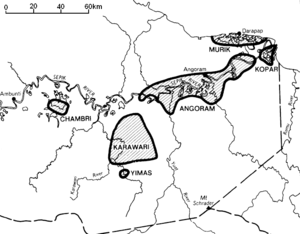Nor–Pondo languages
| Nor–Pondo | |
|---|---|
| Lower Sepik | |
| Geographic distribution: | New Guinea |
| Linguistic classification: |
|
| Subdivisions: | |
| Glottolog: | lowe1423[1] |
 | |
The Nor–Pondo aka Lower Sepik languages are a small language family of northern Papua New Guinea. They were identified as a family by K Laumann in 1951 under the name Nor–Pondo, and included in Donald Laycock's now-defunct 1973 Sepik–Ramu family. Malcolm Ross (2005) broke up the Nor branch and thus renamed the family Lower Sepik; he classifies it as one branch of a Ramu–Lower Sepik language family. Ethnologue (2009) keeps Nor together but breaks up Pondo.
Classification
| Lower Sepik (Nor–Pondo) |
| |||||||||||||||||||||
| |
Ross (2005) notes Murik does not share the /p/s characteristic of the first- and second-person pronouns of Kopar and the Pondo languages, so the latter may form a group: Murik vs Kopar–Pondo. Foley (2005) tentatively proposes that Chambri and Angoram may be primary branches: Nor, Chambari, Karawari–Yimas, Angoram.
Pronouns
The pronouns reconstructed for the proto-language are,
- Proto–Lower Sepik (Ross)
I *ama we two *ka-i, *ka-pia we few *(p)a-ŋk-i-t we all *a-i, *a-pia, *i-pi thou *nɨmi you two *ka-u, *ka-pua you few *(p)a-ŋk-u-t you all *a-u, *a-pu, *i-pu(a) s/he *mɨn they two *mɨnɨmp ? (M),
*mpɨ ? (F)they few *mɨŋkɨ-t they all *mump (M),
*pum (F)- Proto-Nor–Pondo (Foley)
we two *ka-i, *ka-pa-i we few *(pa)ŋk-it we all *a-i, *a-pa-i, *(y)i-i, *(y)i-pa-i you two *ka-u, *ka-pa-u you few *(pa)ŋk-ut you all *a-u, *a-pa-u, *(y)i-u, *(y)i-pa-u they two ? they few *mɨŋkɨ they all *mump ?
Footnotes
- ↑ Hammarström, Harald; Forkel, Robert; Haspelmath, Martin; Bank, Sebastian, eds. (2016). "Lower Sepik". Glottolog 2.7. Jena: Max Planck Institute for the Science of Human History.
References
- Ross, Malcolm (2005). "Pronouns as a preliminary diagnostic for grouping Papuan languages". In Andrew Pawley; Robert Attenborough; Robin Hide; Jack Golson. Papuan pasts: cultural, linguistic and biological histories of Papuan-speaking peoples. Canberra: Pacific Linguistics. pp. 15–66. ISBN 0858835622. OCLC 67292782.
